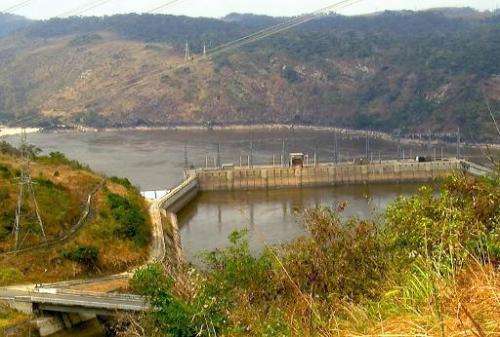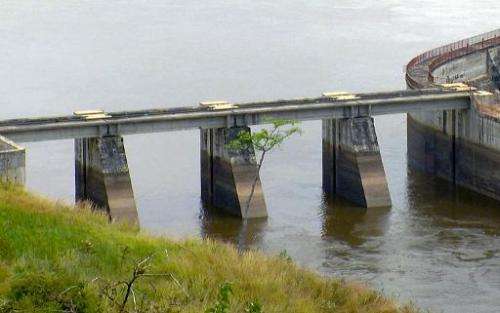General view of Inga hydroelectric dam, west of Democratic Republic of Congo's capital Kinshasa, on August 15, 2011
The World Bank approved Thursday $73.1 million in financing to the Democratic Republic of Congo to support development of the massive Inga 3 hydropower project in the energy-hungry country.
In mid-February the IMF executive board delayed an official review of the proposed technical assistance package for the project that faces opposition from Congolese social and environmental groups.
The $73.1 million grant, along with $33.4 million approved by the African Development Bank late last year, will provide the Democratic Republic of Congo with the world-class expertise to develop its hydropower potential, the World Bank said in a statement.
"By being involved in the development of Inga 3 BC from an early stage we can help ensure that its development is done right so it can be a game changer by providing electricity to millions of people and powering commerce and industry," Makhtar Diop, the World Bank's vice president for Africa, said in the statement.
DR Congo, Africa's third-largest country, is estimated to have the world's third-largest hydropower potential, after China and Russia.
The huge Inga 3 Basse Chute project near Matadi would divert Congo River waters into a 12-kilometer (7.5-mile) channel and then pass them through a 100-meter (330-foot) high hydropower dam on the Bundi Valley before releasing the water back into the river.
The Inga hydroelectric dam, west of Democratic Republic of Congo's capital Kinshasa, on August 15, 2011
The intake would be above the existing Inga 1 and Inga 2 dams, and the outflow downstream from both.
Inga 3 is expected to generate 4,800 megawatts of power, equivalent to the output of three third-generation nuclear reactors.
The World Bank said the technical assistance project will finance environmental and social assessments to guide the development of the project; it does not include any construction or operational activities.
No decision has been taken on whether it will support the eventual construction of Inga 3, the global development bank said.
South Africa a backer
The DR Congo prime minister, Matata Ponyo Maponi, welcomed the grant, saying: "The World Bank Group's involvement in this project reinforces its mission to fight poverty, and its ongoing commitment to help the Congolese government in its goal to move the country along the path to a strong development future."
The Inga 3 project, whose construction is expected to begin in late 2016, was revived after South Africa promised to buy more than half of the power generated, guaranteeing the project's financial viability.
DR Congo plans to sell some 1,300 megawatts of power to mining companies in its Katanga Province, in the southeast of the country, whose development has been limited because of a lack of available energy.
The remainder will provide electricity to DR Congo, where only nine percent of the population has access to electricity.
In a letter to the World Bank in late January, a dozen Congolese nonprofit organizations expressed doubt about how much the project will ease the country's energy gap and raised concerns about its impact on local populations that depend on the Congo River.
The total cost of the project, to be shared by the public and private sectors, is estimated at $12.0-12.5 billion, including $8.5 billion for the construction.
© 2014 AFP

























